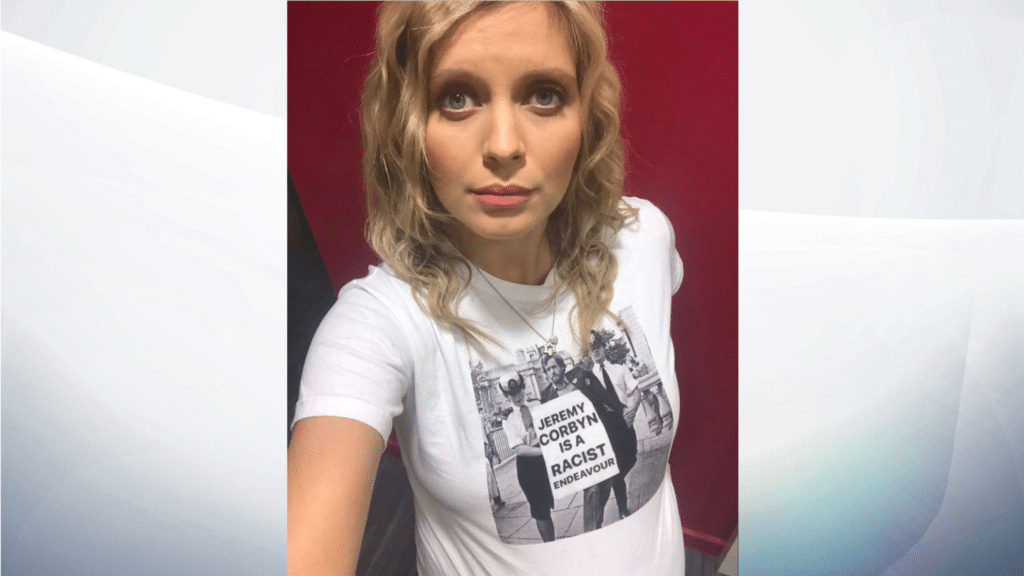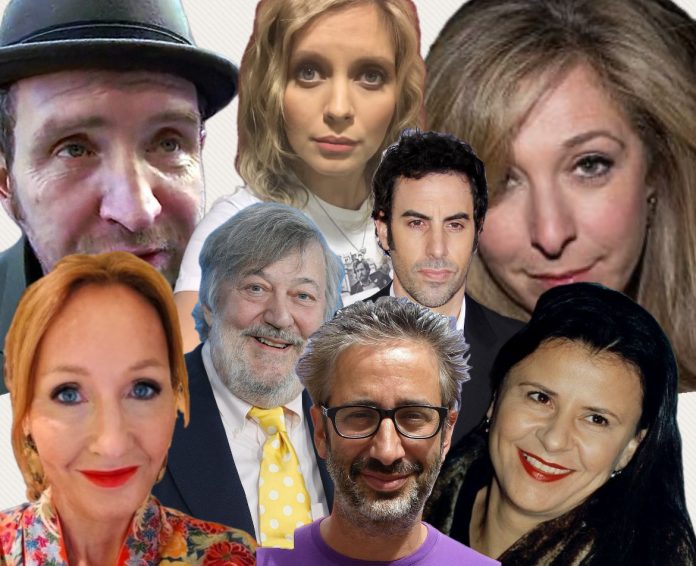During Jeremy Corbyn’s tenure as Labour leader, allegations of antisemitism were weaponised to undermine his leadership. Alongside political opponents, media outlets, and internal Labour factions, several high-profile celebrities played a critical role in shaping public perception of Corbyn as someone complicit in or indifferent to antisemitism. Among the most vocal were Countdown host Rachel Riley, actress Tracy-Ann Oberman, and actor Eddie Marsan. Together, they contributed to amplifying a narrative that ultimately helped to derail Corbyn’s transformative agenda and sow distrust among voters.
This article explores how Riley, Oberman, Marsan and others influenced public discourse, often spreading misinformation and hyperbole, and the profound impact this had on Corbyn’s leadership and Labour’s electoral prospects.
Celebrity Influence in Shaping Political Narratives
Celebrities wield enormous influence in shaping political narratives, particularly in an era dominated by social media. Their opinions, whether informed or not, can shape the views of millions who might otherwise not engage with the complexities of political issues. In Corbyn’s case, the participation of well-known figures like Riley, Oberman, and Marsan played into the broader media campaign to associate Corbyn’s leadership with antisemitism.
By lending their voices to the accusations, these celebrities helped cement the perception that Corbyn’s Labour was institutionally antisemitic, a claim that would later be revealed to be largely exaggerated. Their interventions were often emotionally charged, portraying the issue in black-and-white terms and failing to acknowledge the broader political context.
Rachel Riley: A Vocal Campaign Against Corbyn
Rachel Riley, the co-host of Countdown, became one of the most prominent voices in the campaign to accuse Corbyn of enabling antisemitism within Labour. Her vocal opposition to Corbyn was consistently expressed through social media, where she condemned both Corbyn and his supporters. Riley’s use of Twitter to highlight and spread accusations of antisemitism, often relying on articles and posts that misrepresented the scale of the issue, had a profound impact on public perception.

- Riley’s Campaign: From 2018 onwards, Riley took to Twitter to accuse Labour under Corbyn of being a hostile environment for Jewish people, regularly amplifying claims that painted Corbyn as either indifferent to or complicit in antisemitism. She shared posts that often lacked context and promoted the idea that Labour had a systemic problem, despite the fact that less than 0.1% of Labour’s membership was involved in antisemitism complaints, as revealed in a 2020 internal Labour report. Her engagement on this issue was relentless, and her fame ensured her accusations gained widespread attention.
- Legal Battles: Riley’s activism led to a number of legal battles, most notably with Labour activist Laura Murray, whom Riley sued for libel after Murray accused her of inciting harassment. Riley won the case in 2021, but the trial highlighted the contentious and often aggressive nature of her online activism. While Riley claimed to be standing up against antisemitism, critics argued that her interventions often crossed into harassment, targeting Corbyn supporters without sufficient evidence of wrongdoing.
Tracy-Ann Oberman: A Vocal Opponent of Corbyn
Tracy-Ann Oberman, an actress known for her roles in EastEnders and Doctor Who, was another high-profile figure who relentlessly campaigned against Corbyn. Oberman’s Jewish heritage and her public profile gave weight to her accusations, which she regularly voiced through Twitter and other media outlets.
- Accusations and Social Media Campaigning: Oberman frequently targeted Corbyn supporters and Labour activists, accusing them of antisemitism or complicity in antisemitic behaviour. Like Riley, she conflated anti-Zionism with antisemitism, often attacking individuals who were critical of Israeli government policies but had no history of antisemitic remarks. Oberman’s interventions were particularly aggressive, and her frequent online clashes with Corbyn supporters helped to further the perception that Corbyn’s leadership had enabled antisemitism to flourish.
- Legal Controversies: Oberman, like Riley, found herself embroiled in legal controversies over her accusations. In 2022, she was forced to apologise and pay damages to Dr. Philip Proudfoot, a Labour activist she had wrongly accused of being part of a “Jew-hating” group. This case highlighted the dangers of relying on misinformation and social media-driven activism to make serious allegations, but by this point, Oberman’s efforts had already contributed significantly to the damaging narrative surrounding Corbyn.
Eddie Marsan: An Actor Lends His Voice to the Antisemitism Allegations
Eddie Marsan, a British actor known for his roles in films such as Happy-Go-Lucky and TV shows like Ray Donovan, also played a key role in amplifying the accusations of antisemitism against Corbyn. Marsan, like Riley and Oberman, regularly used his social media platforms to attack Corbyn and his supporters, portraying Labour under Corbyn as a hostile environment for Jewish people.
- Marsan’s Public Condemnation of Corbyn: Marsan frequently expressed his disdain for Corbyn, often focusing on the issue of antisemitism within Labour. He echoed the narrative that Corbyn had failed to properly address the problem, accusing him of being complicit in or indifferent to the antisemitism accusations. Marsan’s interventions, like those of Riley and Oberman, were highly emotional and often lacked nuance, simplifying a complex issue into a binary choice between being “for” or “against” antisemitism.
- Involvement in Online Disputes: Like Oberman, Marsan engaged in numerous heated online debates, particularly on Twitter, where he often clashed with Corbyn supporters. His involvement in these debates further amplified the media-driven narrative that antisemitism was a pervasive problem within Labour, despite evidence suggesting that the problem had been grossly exaggerated for political purposes. Marsan’s celebrity status helped to draw further attention to the accusations, ensuring that the issue remained at the forefront of public discourse throughout Corbyn’s leadership.
Other High-Profile Figures Who Contributed to the Smears
Other well-known celebrities were at the forefront of promoting the idea that Corbyn was either indifferent to, or complicit in, antisemitism. While some of these figures may have acted out of genuine concern, their interventions were often based on misinformation or misrepresentations of the actual extent of antisemitism within Labour.
- JK Rowling: The Harry Potter author was one of the most vocal celebrity critics of Jeremy Corbyn, frequently expressing her disdain for his leadership on social media. Rowling, who has a massive following, repeatedly called out Corbyn over antisemitism, accusing him of failing to deal with the issue within Labour. She shared tweets and posts that painted Labour under Corbyn as an institutionally antisemitic party, despite evidence to the contrary. Rowling’s interventions were particularly impactful due to her international fame, and her comments were widely covered by the press, reinforcing the narrative that Corbyn’s Labour had a deep-seated problem with antisemitism.
- Stephen Fry: The British actor, writer, and comedian, known for his intellect and humanitarian causes, also weighed in on the antisemitism row. In 2018, Fry signed an open letter, alongside other prominent figures, condemning Corbyn for what they described as a failure to properly address antisemitism within Labour. While Fry is generally known for his considered approach to political issues, his involvement lent credibility to the claims being made by Corbyn’s opponents. The letter he signed accused Corbyn of tolerating an environment where antisemitism was allowed to thrive, a claim that was widely reported in the media and further damaged Corbyn’s standing with the public.
- Tracey Ullman: Comedian and actress Tracey Ullman participated in undermining Corbyn with a satirical sketch on her show, Tracey Breaks the News, aired by the BBC in 2018. In the sketch, Ullman portrayed Corbyn as someone who dismisses or trivialises antisemitism within Labour. The sketch played into existing stereotypes and media narratives about Corbyn’s supposed indifference to antisemitism, reinforcing public perceptions that Labour had failed to address the issue seriously. The use of satire made light of a complex issue but had the effect of bolstering accusations against Corbyn in the eyes of viewers.
- David Baddiel: British comedian and writer David Baddiel, himself of Jewish heritage, was another high-profile critic of Corbyn. Baddiel frequently used his platform on social media to condemn Corbyn’s handling of antisemitism. In 2018, Baddiel appeared on BBC Question Time, where he criticised Corbyn and argued that there was an institutional problem of antisemitism within Labour. Baddiel’s comments were widely circulated and contributed to the perception that Corbyn had failed to deal with antisemitism effectively. While Baddiel’s perspective was informed by his personal experience as a Jewish public figure, his remarks often lacked the nuance necessary to differentiate between legitimate criticism of Israeli policies and antisemitism.
- Sacha Baron Cohen: The comedian and actor behind characters such as Borat also spoke out against Corbyn. In 2018, Baron Cohen criticised Corbyn at the Anti-Defamation League’s International Leadership Awards, accusing him of fostering a culture of antisemitism within Labour. Baron Cohen’s remarks received significant media coverage, particularly in the United States, where he enjoys considerable fame. His intervention added an international dimension to the antisemitism accusations against Corbyn, further damaging his reputation.
The Broader Impact of Celebrity Interventions
The interventions of Riley, Oberman, and Marsan were part of a broader effort to portray Labour under Corbyn as an institutionally antisemitic party. While genuine cases of antisemitism did exist within Labour, the scale of the problem was often exaggerated, and the issue was weaponised by Corbyn’s political opponents, including factions within Labour itself. The involvement of high-profile celebrities added significant weight to these accusations, influencing public opinion and contributing to a widespread perception that Corbyn was unfit to lead.
- Misinformation and Hyperbole: Riley, Oberman, and Marsan frequently relied on misinformation or took incidents out of context to support their claims. This lack of nuance led to a distorted picture of antisemitism within Labour, with many ordinary voters coming to believe that Corbyn had presided over a party rife with antisemitic sentiment. In reality, as Labour’s 2020 internal report revealed, the number of antisemitism complaints was very small, and the issue had been magnified to serve political ends.
- Media Amplification: The media eagerly seized on the accusations made by Riley, Oberman, Marsan, and other celebrities, ensuring that the antisemitism issue dominated coverage of Corbyn’s leadership. This relentless focus on antisemitism distracted from Labour’s broader policy platform, which included ambitious proposals to address inequality, reform public services, and tackle climate change. The constant media attention also contributed to creating an atmosphere in which Corbyn was seen as unelectable, helping to pave the way for Labour’s crushing defeat in the 2019 general election.
- Overshadowing Corbyn’s Policy Agenda: One of the most damaging effects of the celebrity-driven antisemitism campaign was that it overshadowed Corbyn’s policy agenda, which focused on wealth redistribution, public ownership, and tackling inequality. The sustained focus on antisemitism, amplified by figures like Riley, Oberman, and Marsan, meant that these policies were often ignored or marginalised in the media. Instead, the public was fed a narrative that Labour under Corbyn was a party consumed by division and plagued by allegations of antisemitism.
The Role of Celebrities in Undermining Corbyn
The participation of Rachel Riley, Tracy-Ann Oberman, and Eddie Marsan in the antisemitism allegations against Jeremy Corbyn played a significant role in shaping public perception and influencing political discourse. By using their platforms to amplify a narrative that Labour was institutionally antisemitic, these celebrities contributed to the weaponisation of antisemitism as a political tool. Their interventions, while likely motivated by genuine concerns, often relied on misinformation, oversimplification, and emotional rhetoric.
The result was a distortion of the true extent of antisemitism within Labour, and a distraction from Corbyn’s broader policy agenda. The sustained focus on this issue, amplified by celebrities and the media, helped to ensure that Corbyn’s transformative political vision was never realised, and it contributed to Labour’s defeat in the 2019 general election. This episode serves as a stark reminder of the power celebrities have to shape political narratives, and the potential dangers when these narratives are based on incomplete or misleading information.







